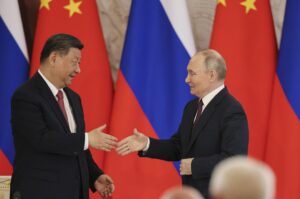To the bombard nuclear facilities of Iran at dawn (local time) this Sunday (22)the United States acted directly in aid to an ally: Israel, who exchanges attacks with Tehran since the last 13th.
Although the Donald Trump government has then claimed that it was a punctual intervention and that does not plan a regime change in Iran – Contrary to Israeli Premier Benjamin Netanyahu, who asked for a uprising in the enemy country – the American action sends messages to the two main geopolitical rivals of the United States today, China and Russia, and therefore to the world.
Russia “vehemently condemned” bombings to Iran and called them “A serious violation of international law, the UN Charter and the UN Security Council resolutions.”
China followed the same line and offered to “work with the international community to unite efforts and defend justice, and contribute to the work of restoration of peace and stability in the Middle East.”
For Alan Pino, an analyst at the American Think Tank Atlantic Council, Trump’s main message is that, as much as his speech is to avoid starting or intensifying conflicts, his patience has limits – precisely at a time when the US president is still charged because he has not collected concrete results in negotiations with Russia to end the war in Ukraine.
“Regardless of Iran sitting at the table or not [para negociar]with the attacks on Iranian nuclear facilities, Trump has sent a powerful signal to Iran, Russia and China supporters that his desire to avoid getting involved in new wars does not prevent him from using strength when he believes that US central interests are at stake, ”Pino wrote in an article.
Another Atlantic Council analyst, John E. Herbst, former USA USA Ukraine, said Trump “is now in a much stronger position” to negotiate with Russian dictator Vladimir Putin.
“Russia did nothing but verbally defend its ally, Iran. If the United States begins to exert the pressure on Russia that Trump promised Putin to prevent peace, he will take a big step to stop Russian aggression in Ukraine,” Herbst said.
However, in an interview with NPR, Nicole Grajewski, a member of the Carnegie Foundation’s Nuclear Policy Program for International Peace, stressed that China and Russia “never offered Iran help or mutual assistance when it comes to military affairs” (ie never really Tehran allies in this regard), and that Trump will need to be aware that Moscow and Beijing do not use the attack on Iranian nuclear installations to To divert attention from the aggressions made by the two American rivals – from Russia against Ukraine and China against Taiwan.
“I think the narrative that comes out of this attack, especially in the global south, really favors the kind of worldview that Russia and China sought to create about this anto -agent multipolar order. And therefore, they have taken advantage of this to form a coalition of states that oppose the United States,” Grajewski described.
“They can also use this attack for a horizontal climb and see this conflict as a way of diverting attention from other issues, such as Ukraine, for example,” he warned.











